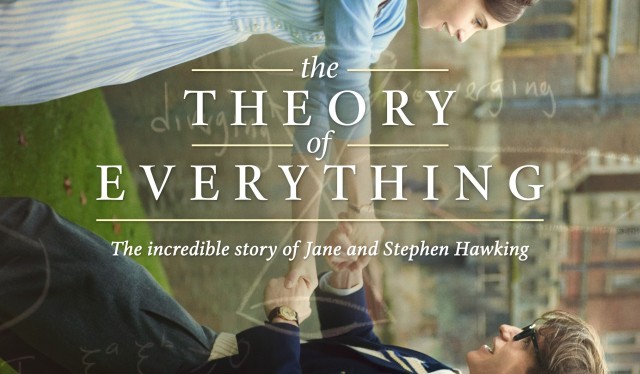 ‘The Theory of Everything’ is, if not very thought-provoking, a romanticised portrayal of a man reputed to be of a great mind, inflicted with a motor neurone disease, and with exceptional luck. We should ask ourselves how or why we know of Stephen Hawking. He is world-famous primarily because he wrote a brilliant and deeply philosophical book (though he denies it and rejects philosophers), that was a bestseller as well, despite being unable to move, speak or emote. It is that which fascinates all of us, and that is the reason films are made about his life. His is not a story of historical discoveries in the field of science. His is the story of the human instinct of survival, of resilience, and of sheer determination. He is one exceptional man and stands out from all the other pioneering men of the world because he turned his liability into a brilliant marketing tool, whether consciously or not is up to individual interpretation.
‘The Theory of Everything’ is, if not very thought-provoking, a romanticised portrayal of a man reputed to be of a great mind, inflicted with a motor neurone disease, and with exceptional luck. We should ask ourselves how or why we know of Stephen Hawking. He is world-famous primarily because he wrote a brilliant and deeply philosophical book (though he denies it and rejects philosophers), that was a bestseller as well, despite being unable to move, speak or emote. It is that which fascinates all of us, and that is the reason films are made about his life. His is not a story of historical discoveries in the field of science. His is the story of the human instinct of survival, of resilience, and of sheer determination. He is one exceptional man and stands out from all the other pioneering men of the world because he turned his liability into a brilliant marketing tool, whether consciously or not is up to individual interpretation.
That Hawking struggled is without doubt, which is perhaps why the movie also delves, quite justifiably, into the hardship and toil that his self-sacrificing wife had to endure. Hawking was diagnosed with a rare form of motor neurone disease during his tenure at Cambridge at twenty-one, which gradually paralyzed his body, and eventually robbed him of speech. Jane Wilde stood strong by him throughout most of his life, sacrificing her own love for another man in order to take care of him. Jane Wilde comes across as a woman of integrity, loyalty and duty. Sheis portrayed almost as a saint, though in real life she managed to find a balance between her academic pursuits (she finished her PhD in Modern Spanish Poetry) and her arduous familial commitments. But her loyalty and allegiance to her difficult and uncompromising husband, despite her infidelity, is portrayed as spotless. It seems redundant to stamp a feminist analytical structure because this is a real life story. She does ultimately escape (or was she released?) to the arms of her future husband. However, she does seem to function in the movie as a character to be used to reveal Hawking’s humanity and personality. But the story is fair and reveals Hawking’s deep insecurity and doubt in his wife’s acts of love, which he saw as insincere acts of obligation, and his sheer happiness at being able to find someone who he with whom he could simply communicate and laugh.
Another counterpart of Jane is Alicia Nashwife of John Nash in A Beautiful Mind (2001), whose life, too, revolved around her mentally ill husband. Both movies are of the same genre, focusing on the personal and extraordinary lives of great men, and both eventually and ultimately end up stressing the importance of love, determination and perseverance, while simultaneously illuminating the sacrifices made by the wives of these tall men. No one is an island, and such movies seek to inspire and motivate, but also to bridge the gap between ordinary folks like us and the ones who are visionaries or of great minds.
 Yet there seems to be something missing. But what is it? Maybe it is sheer drama. A Beautiful Mind was intense, suspenseful, moving and dramatic, while being relatable at the same time. The Theory of Everything is a straightforward rendition of a man who conquered life, but will it resonate? That is not to say that technically there is anything wrong with the movie – it is immaculate and flawless. But the movie did not engross us enough, according to me. He remains a distinct entity even at the end. We do not despise him, we might even like him, but we don’t feel happy for him like we do for his wife perhaps, who is self-sacrificing, tenaciously loyal, sincere and devoted, with her quintessential moments of depression. When he breaks down after Jane tells him that she loved him and tried her best, it should make us cry, and yet we feel more sympathy for Jane (maybe that was the intention). There were times when I wondered whose story it actually was, Hawking’s or his wife’s. Ultimately the narrative is fair to both Hawking and Jane, and like said before, impeccable, as it comes, in typical British setting, diction and mannerism. What was perhaps jarring was the Americanised accent of machine that speaks on command of the physically challenged Hawking.
Yet there seems to be something missing. But what is it? Maybe it is sheer drama. A Beautiful Mind was intense, suspenseful, moving and dramatic, while being relatable at the same time. The Theory of Everything is a straightforward rendition of a man who conquered life, but will it resonate? That is not to say that technically there is anything wrong with the movie – it is immaculate and flawless. But the movie did not engross us enough, according to me. He remains a distinct entity even at the end. We do not despise him, we might even like him, but we don’t feel happy for him like we do for his wife perhaps, who is self-sacrificing, tenaciously loyal, sincere and devoted, with her quintessential moments of depression. When he breaks down after Jane tells him that she loved him and tried her best, it should make us cry, and yet we feel more sympathy for Jane (maybe that was the intention). There were times when I wondered whose story it actually was, Hawking’s or his wife’s. Ultimately the narrative is fair to both Hawking and Jane, and like said before, impeccable, as it comes, in typical British setting, diction and mannerism. What was perhaps jarring was the Americanised accent of machine that speaks on command of the physically challenged Hawking.
The Theory of Everything opens up the eternal debate of the existence of God versus the physicist’s version of the creation of the universe, and rightfully (flawless, like I said) remains incredibly sly in this matter by ending that debate with the prototypical answer of ‘where there is life, there is hope’, but also accentuating that religion is a creation of human civilization to find order out of chaos. It is a rationalistic conclusion, and rightfully (again) so. The movie is almost mechanical in its effort to be perfect, almost robotic… like Hawking’s Americanised voice. It is motivational, even inspirational, and like in real life, Hawking in the movie too seems to function as a philosopher and hero. But is it a movie that is worth remembering, like A Beautiful Mind, whichstill resonates today after fourteen years? Only time will tell, but we all sure will remember Stephen Hawking who taught us the theory of success.
By Ananya Tiwari































